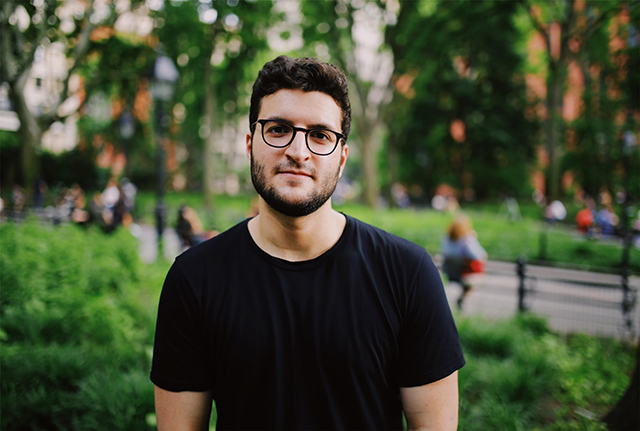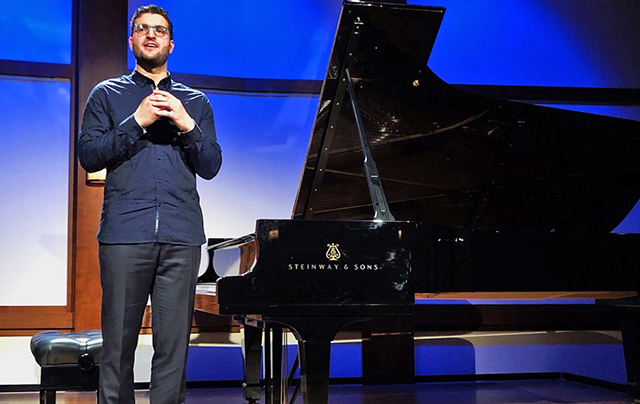Creativity is key for this data scientist and concert pianist
For Omar Abboud, machine-learning models and classical piano concertos have more in common than meets the eye (or ear). A data scientist by day and concert pianist by night, Abboud unravels complexity, whether he is sitting at a keyboard or behind the keys of a baby grand.
Abboud, S.M. ’17, began learning to play the piano at age 4, which was also around the time he began developing an interest in science. While he was enamored by the latest technology, it was actually Abboud’s family history that inspired him to study engineering.
“My grandfather was a Palestinian refugee, and it was his education that brought him out of that situation. He traveled all the way to the U.S. to achieve his dream of completing his university studies, and he studied engineering,” he said. “The value of education as a means to freedom and success was a very big influence on my decision to pursue engineering.”

Abboud earned a bachelor’s degree in operations research from Columbia University and then enrolled in the computational science and engineering master’s program offered by the Institute for Applied Computational Science (IACS) at the Harvard John A. Paulson School of Engineering and Applied Sciences to leverage his technical training with practical applications in business and academia.
He enjoyed the opportunity to work with students who had very diverse backgrounds and interests, while exploring his own passions through data science. Abboud’s capstone project combined his love of music and his fascination with technology. Working with Spotify, his team developed a machine-learning model that uses musical features in songs to provide playlist recommendations for users.
“As a musician, I’ve thought so much about how to bring music to people, how to evoke certain feelings, and how to communicate with an audience through performance,” he said. “Studying whether intrinsically different sounds cause people to react positively or negatively was a very interesting angle.”
After graduation, Abboud joined Squarespace, a web publishing platform for individuals and businesses to create websites, as a data scientist. He examines different forms of advertising media Squarespace uses to help the company make strategic decisions about how to deploy media and allocate the marketing budget. Working with such a vast amount of data is his biggest challenge.
“You have to understand how to digest qualitative and quantitative data, and then make a decision on how to predict the importance of each piece in bringing the customer to the business,” he said. “Squarespace is taking a leading role in using data science to optimize these strategic decisions and bring technical rigor to the traditional tools of this field.”
Abboud enjoys working with a team that is diverse and dynamic on problems that require a lot of creativity to solve.
Flexing his creative muscles through music makes him a better data scientist, Abboud said. He continues to play with a chamber trio in New York City, and has performed at Carnegie Hall, the Italian Academy, Symphony Space, and Lincoln Center.
“The piano is a special instrument because it has an extraordinary range of possibilities,” he said. “Because of that range of expressions, playing piano has never been boring for me. You can spend a lifetime discovering the piano.”

Outside the concert halls, Abboud’s involvement in the New York City musical community led him to take on another technological initiative as a Global Shaper with the World Economic Forum.
The World Economic Forum’s Global Shaper program forms a network of young people contributing to the dialogue about global economic policy. Abboud worked with a small team of other Shapers in New York City to create a website that helps recently arrived immigrants and refugees find the resources they need to start lives in the U.S. in their native languages.
“The issues that refugees and immigrants face when they first come to North America are very familiar to me. I thought to myself, in the wake of the current refugee crisis, is there something I can do as someone who is trained in tech?” he said. “The things immigrants and refugees experience during their first few months in the U.S. really set them up for success or failure down the road, so that was a key area for intervention that I thought would be very impactful.”
For Abboud, the opportunity to make an impact—whether he is analyzing marketing data at Squarespace, playing chamber music for a rapt audience at Carnegie Hall, or developing a tool to help immigrants find better lives—is both inspiring and humbling.